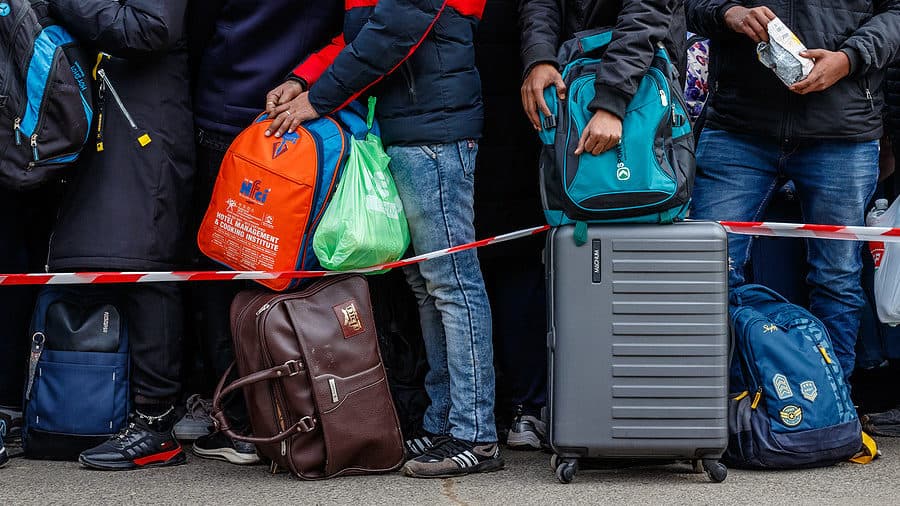In Afghanistan, Abdul (whose last name is omitted to protect his security) had a good job, working as a linguist and cultural advisor. But after the U.S.-led coalition withdrew from his country in August 2021, “I lost everything,” he said at a recent event.
Even though he was a mid-career professional, upon coming to the U.S. as a refugee, “I struggled to find a job,” he explained. Employers said he was overqualified. Meanwhile, he had a family to support — not just his immediate family but relatives who stayed in Afghanistan, too.
A job fair changed his life — he now works for Hilton as a safety and security manager.
“It’s my second home. It’s a great place to work,” he said at the U.S. Business Summit for Refugees, a recent event held by the Tent Partnership for Refugees, a nonprofit organization launched by Chobani Chairman and CEO Hamdi Ulukaya in 2016. At the summit, 45 companies — including ManpowerGroup, PepsiCo, Pfizer, Tyson Foods, and Amazon — pledged to hire over 20,000 refugees over the next three years. It’s the largest commitment to hiring refugees on record. In addition, companies like Coursera also pledged to help connect refugees with job-training programs.
A Growing Need
Record numbers of people have been forced into becoming refugees over the past few years. Many of them have arrived in the U.S, where one of their central tasks in establishing new lives is to find employment. In addition to refugees from other countries, the withdrawal from Afghanistan and the Russian invasion of Ukraine have sent 200,000 Afghans and Ukrainians to the U.S.
“America’s leading brands are stepping up on this issue,” says Yaron Schwartz, Tent’s associate director for global partnerships. “This is one moment as part of our broader call to action to continue hiring and training refugees in the United States.”
Perhaps the main sector making a commitment to hire refugees is the hospitality industry. This includes Oneida Nation Enterprises in upstate New York, which operates multiple properties, like the Turning Stone Resort Casino, and has a history of hiring refugees that dates back to the conflict in Bosnia in the early 1990s.
Dana Sovocool, Oneida’s vice president for human resources, says that hiring refugees is part of their welcoming ethos. “It’s always been who we are,” he explains. “There are hundreds of years of Oneida people welcoming colonists, refugees, immigrants, and others.”
Today, refugees working for Oneida come from 16 countries, including Burma, Sudan, Somalia, and Afghanistan. Many are hired into guest-facing roles, such as in gaming operations, while others are in non-guest-facing positions like housekeeping and culinary jobs. Some refugees have even entered management and leadership positions.
Hiring refugees has been positive, Sovocool says, explaining: “The refugee population is extremely loyal and hardworking. They enrich our community. The relationships that our team forms with refugees are really special. It enhances cohesion in our team. People want to learn from each other, refugee and non-refugee. They want to help each other.”
Rising to Meet the Challenge
Hiring refugees often takes place at regional job fairs or through referrals by nonprofit agencies. As part of the resettlement process, refugees already have legal authorization to work in the United States. And in many sectors, hiring a refugee isn’t that different from hiring another worker.
In some ways, however, hiring refugees can be more involved than hiring other workers. In addition to cultural differences, refugees may arrive with gaps in their credentials or mismatches in their skills. At the same time, U.S. companies often work with one or more of nine federally-approved resettlement agencies, nonprofit organizations that work with the State Department to provide services to refugees. In some cases, employers find themselves offering infrastructure and services to refugees.
For example, Oneida has built employee housing and provides transportation. It is also investing in bridging the language gap: In conjunction with the Tent Partnership, the company plans to hire in-house interpreters and to work with an online tool to provide translations.
Another company with a long history of hiring refugees is Great Lakes Cheese, a cheese manufacturer and packager headquartered in Hiram, Ohio. More than 30 years ago, the organization began hiring Hmong refugees fleeing conflicts in Southeast Asia to work on its production lines, leadership roles, and in other jobs. That effort has provided a large supply of workers — almost half of its Wisconsin workforce is made up of Hmong people. (This is an example of how refugees can help fill labor shortages, as well as bring diverse skills and perspectives.)
Great Lakes Cheese has since extended its effort to hiring Afghan refugees. It hired its first Afghan refugee a year ago: Waisuddin Habibzai had applied for a position in the manufacturing facility, but the organization realized that he would be better-matched for a talent development role. Today, Habibzai serves as a liaison for a dozen fellow Afghan refugee-employees, helping them with housing, transportation, and other logistics.
As Allison Bolet Cafaro, Great Lakes Cheese’s manager of diversity, equity, and inclusion, explains: “We’re family-friendly. We’re good stewards of the community. This feels like the natural progression of who we are, to step into spaces where there is need.”
